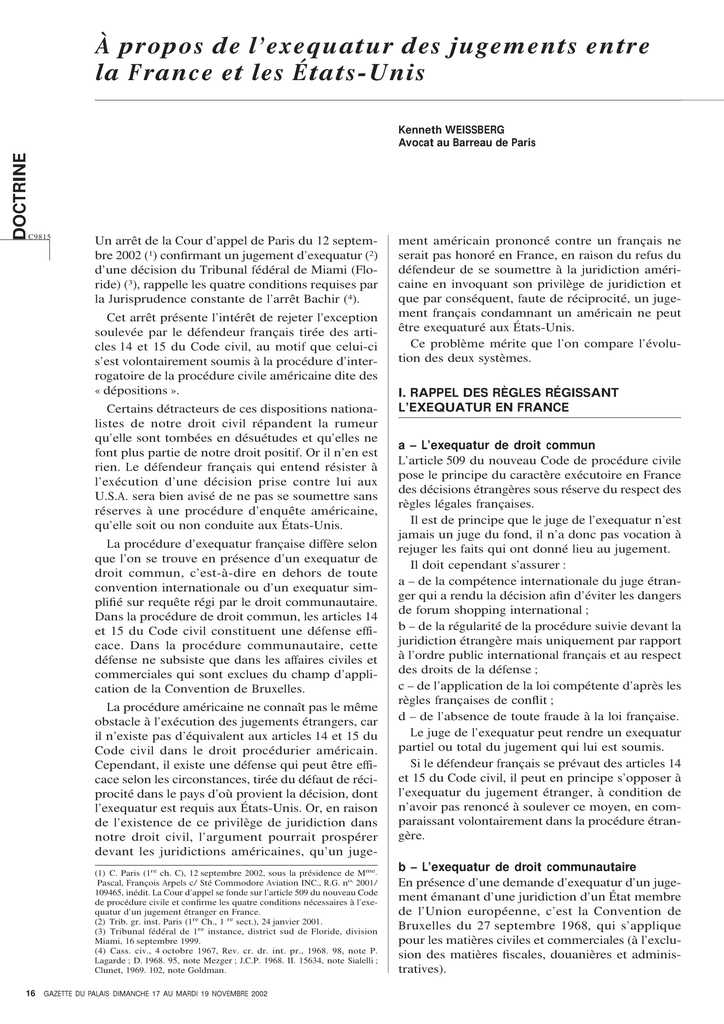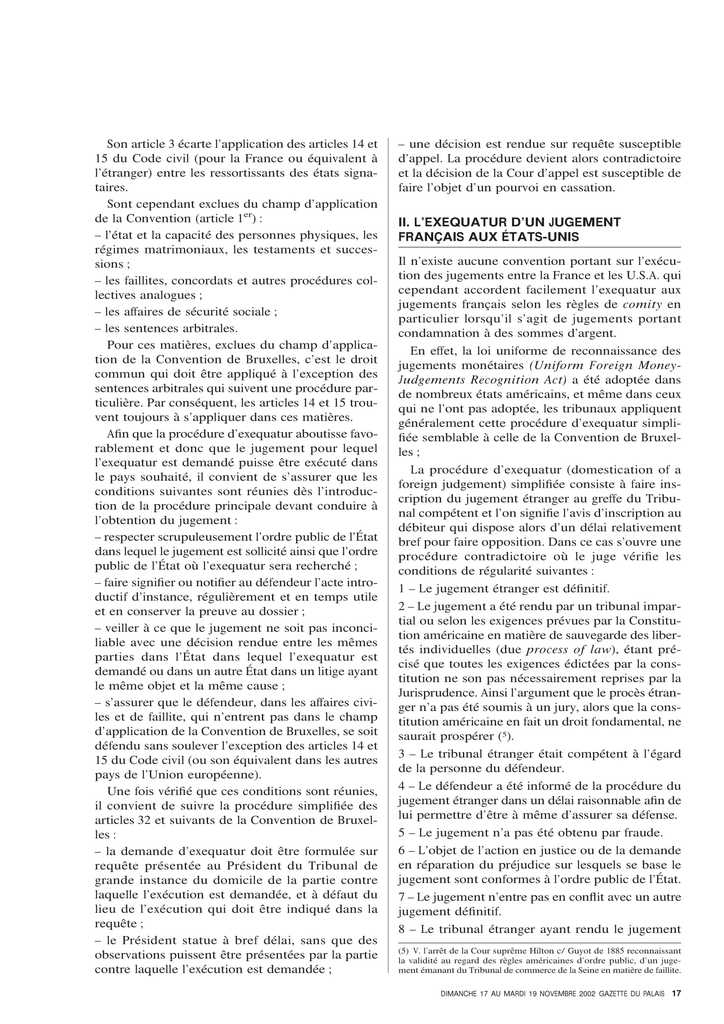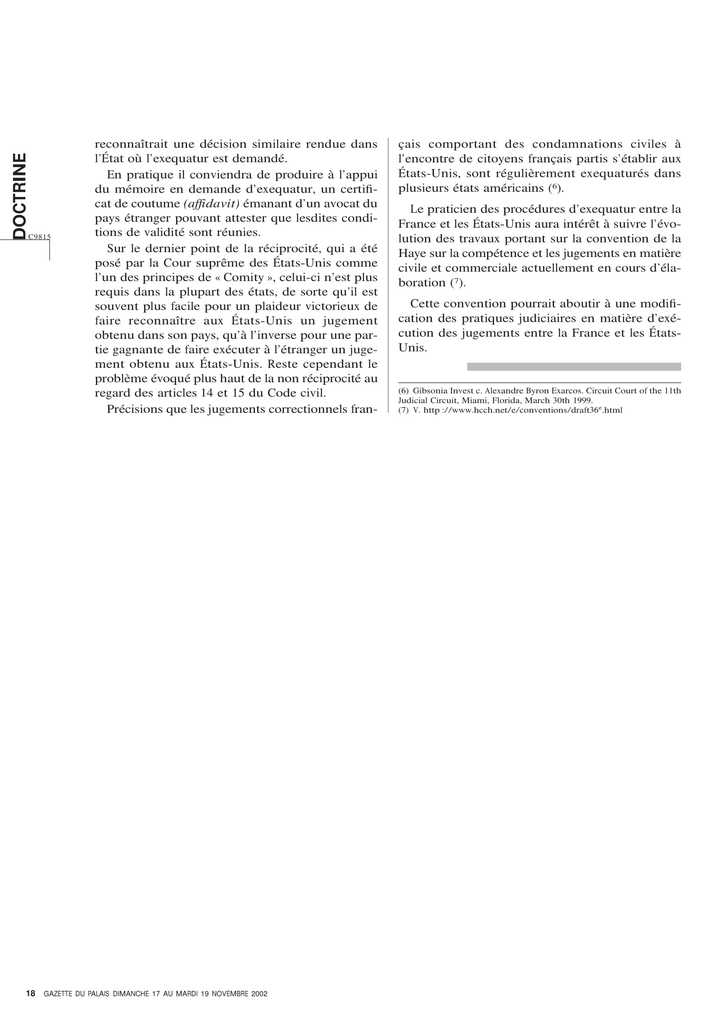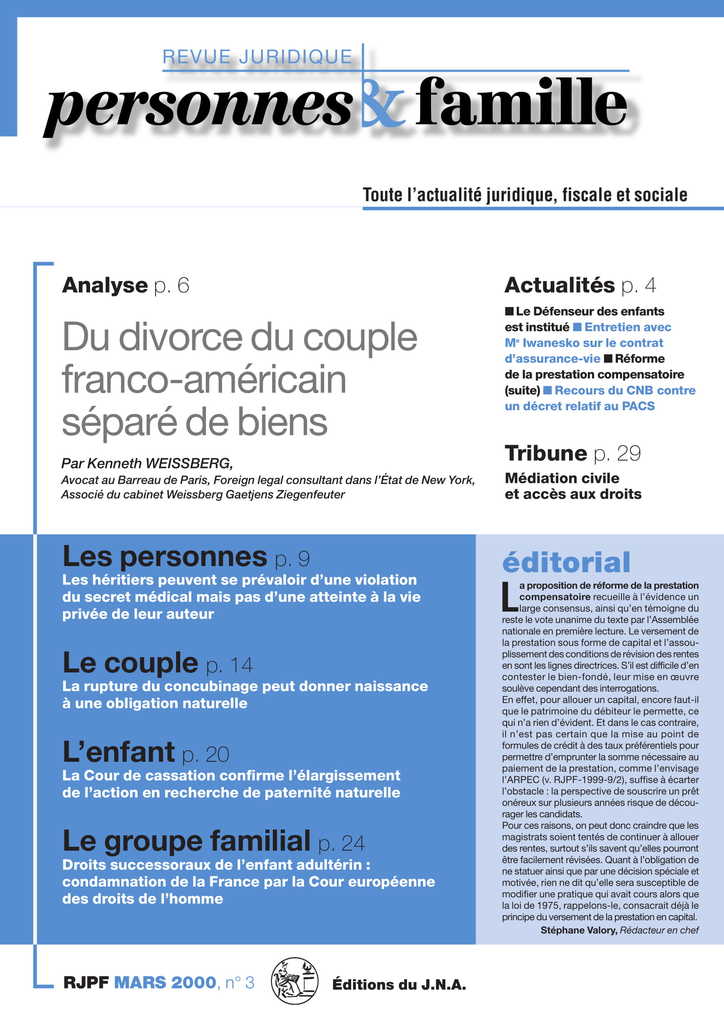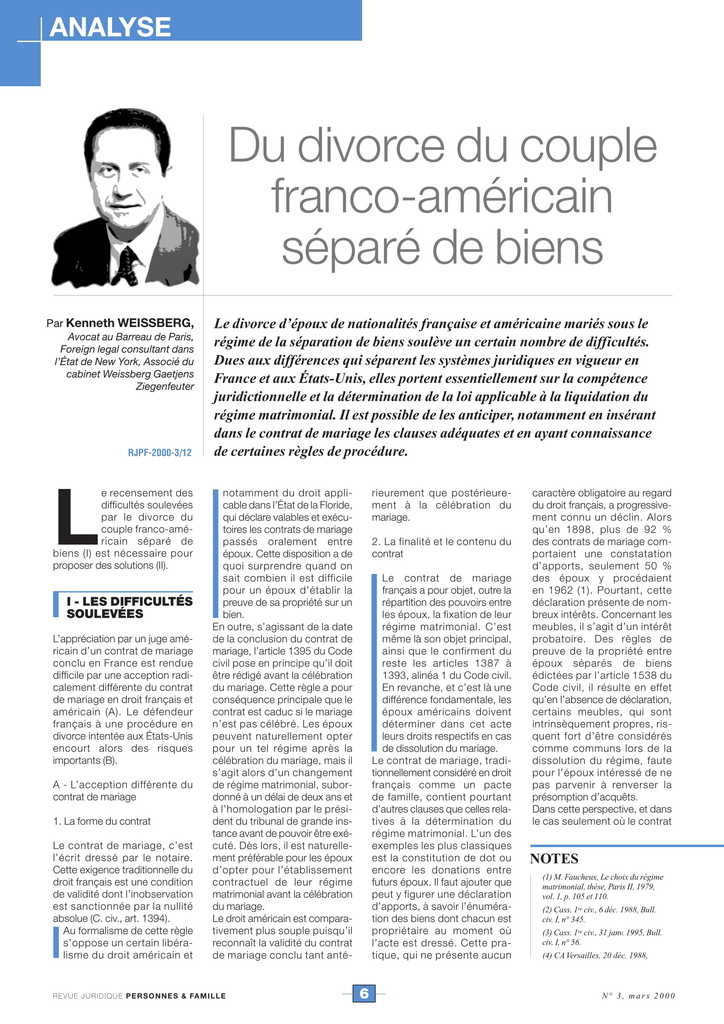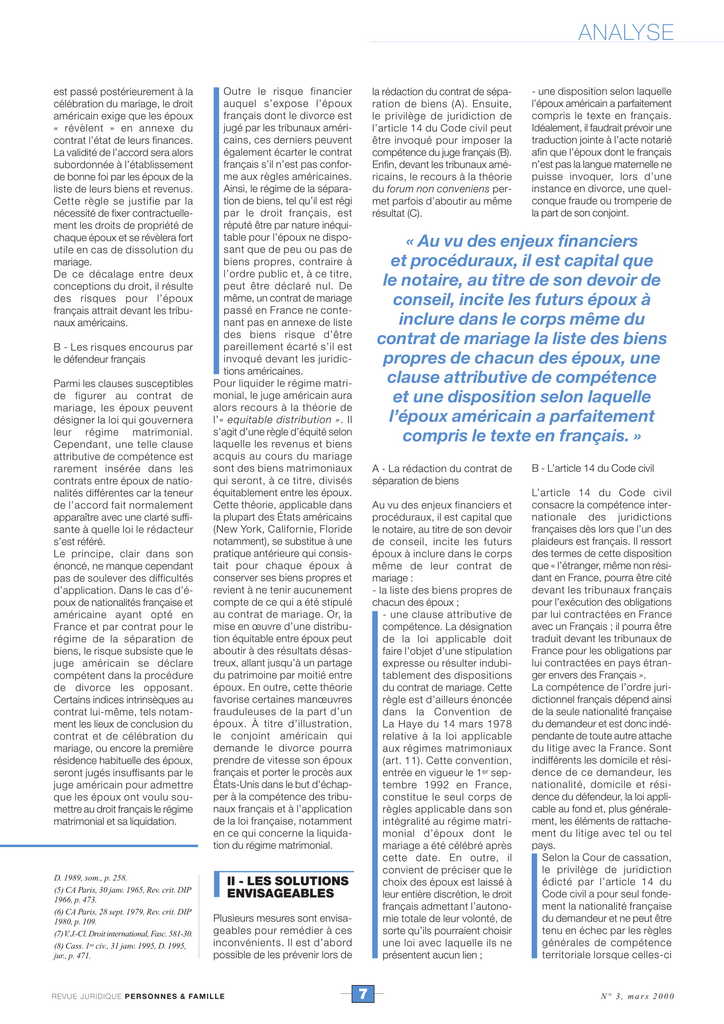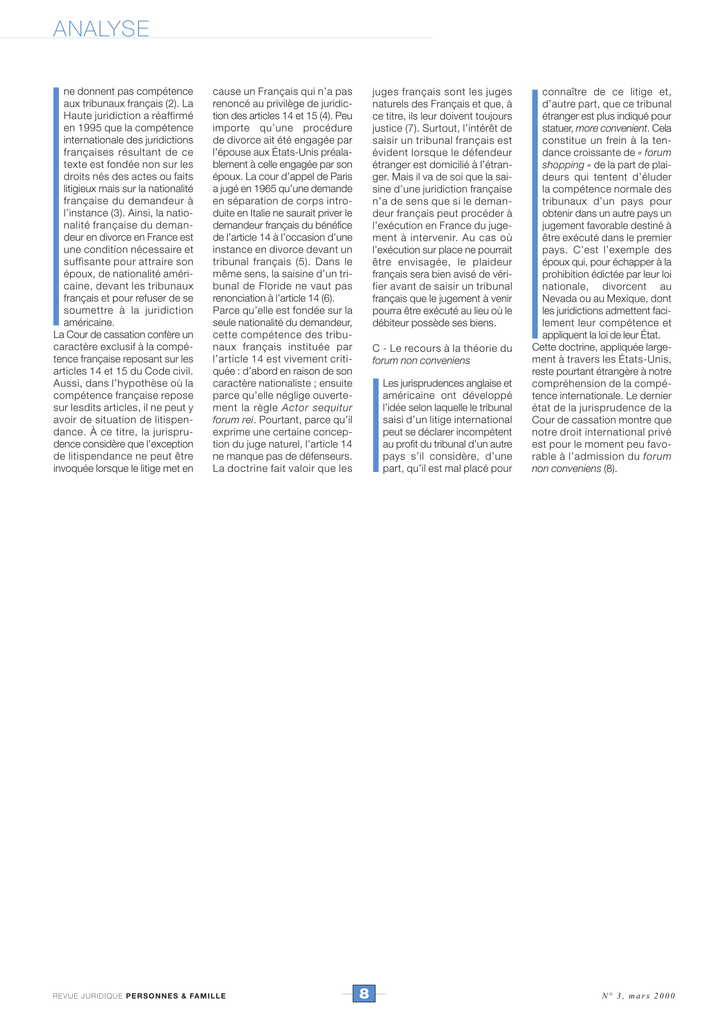Kenneth WEISSBERG, Lawyer at the Paris Bar; Narjess NAOUAR, Student lawyer at the EFB in Paris
This question challenged us in a case which was submitted to the courts
Algerian women. The facts of the case were as follows: an Algerian national was
victim in 2002 of a plane crash in which 14 people died. The ticket
had been issued by Air Algérie for the Algiers - Cairo - Algiers route, but the
Algerian company had joined the services of another airline Egyptair.
It was near Tunis, where a stopover was planned during the Cairo - Algiers route that
produced the disaster. The victim suffered very significant damage, of a nature
psychological, physical and economic which she requested compensation from Air Algeria,
Egyptair and Boeing, manufacturer of the aircraft. The judgment in this case, which
been confirmed on appeal has put Egyptair - carrier in fact! - and Boeing, and
retained the responsibility of Air Algeria for an amount not yet fixed, an expertise having
been ordered for the purpose of determining the harm actually suffered by the victim.
The complainant requested compensation for the bodily and non-material damage suffered by her, founding
its action on the Warsaw Convention of 1929.
The Convention for the Unification of Certain Rules for International Carriage by Air
was signed on October 12, 1929 in Warsaw. It establishes a uniform international regime and has
the purpose of standardizing in the air transport of people, luggage and
goods, the rules relating to tickets and civil liability of the
carrier.
The Warsaw Convention applies in particular to all international transport of persons
performed by aircraft for remuneration. When it does not apply, it comes back to each
national legislation to determine the conditions of third party liability of the air carrier as well
that the types of damage giving rise to compensation and the extent of the compensation which will be
possibly paid.
When the Warsaw Convention is applicable and in the cases provided for in Articles 17 to 19, "any action for liability, in any capacity whatsoever, may be brought only under the conditions and within the limits" that she plans.
It is therefore not possible to circumvent the rules of the Warsaw Convention by availing oneself
other rules: it governs the dispute exclusively - this point has been the subject of important
doctrinal and jurisprudential discussions - and national laws will only intervene on
the subjects it does not deal with.
The presumption of responsibility laid down by Article 17 of the Warsaw Convention finds
application where an accident on board an aircraft was the cause of the damage for which it
is requested repair. Thus, any damage, material or bodily, suffered by the passenger
during the time of transport presumes the fault of the carrier and engages its
responsibility.
The Warsaw Convention lists three categories of cases for which the applicant
can take legal action. One of these categories covers death, injuries and injuries
bodily.
If the expressions "death" and "injury" do not call for particular observations, it
is otherwise from the concept of "bodily injury". The question is whether this
expression, referred to in Article 17 of the Warsaw Convention, includes trauma
caused by the accident and which led to feelings of anxiety and depression as well as
other emotional and psychological damage, which would compensate
moral prejudice suffered, on the basis of this text.
There is no international jurisdiction ensuring a uniform interpretation of the
Warsaw Convention. It is therefore likely to have a different scope depending on the
country.
Furthermore, the Warsaw Convention only regulates the origin of the damage, its causes
(death or injury), it defers to national law for the determination of damages
compensable and the extent of compensation.
Under Article 28 of the Warsaw Convention, the applicant has a choice, which allows "forum shopping". Thus, he can practically choose between three forums, on the condition that they are located "in the territory of one of the High Contracting Parties":
• the court at the main seat of the carrier's operation or its domicile;
• the court of the place where the carrier has an establishment by whose care the contract was concluded;
• the court of the place of destination.
The court of the place of call and the court of the place of occurrence are therefore excluded
the accident if the carrier is not established.
Thus, the claimant will in practice be led to choose the court which will accept to compensate
a certain type of damage, or the one that will give him the greatest compensation.
The issue of compensation for mental harm has given rise to a number of
decisions in France and the United States, countries sharing the prominence in terms of
air disputes.
I. Reparation for non-pecuniary damage in France
It should be noted that in matters of air carrier liability, the rules of the Warsaw Convention are applicable both in domestic law and in international transport within the meaning of the Warsaw Convention. In fact, the Civil Aviation Code (1) makes the provisions of the Warsaw Convention on the liability of air carriers applicable in French domestic law. The responsibility of the air carrier can only be sought under the conditions and limits provided for by the international treaty.
In France, airlines often tend to compensate automatically and
of themselves the victims in the event of an air crash, without even waiting for the latter to
resort to justice. Thus, the French courts have still not had to rule
on the question of what is covered by the concept of "bodily injury", if it includes
only the lesion which only causes physical harm or if it also includes
an injury which caused psychological damage.
In one case (2) where the problem could have been posed - victims of an act of piracy
demanded compensation for their “physical, nervous, material and moral damage” -
Compagnie Air France did not contest the application to the facts of the case of article 17 of
the Warsaw Convention. A judgment (3) rendered by the Court of Cassation in 1982, without examining
the issue head on or hold the air carrier liable, reports damage
experienced by passengers victims of an air piracy operation "both in terms
physical than psychically. " In this case, the air carrier had been exempt from
any responsibility for the physical and psychic damages undergone by passengers not
not because the psychological damage would not be compensable but because the carrier
proved that he had taken all necessary measures to avoid the damage within the meaning of
Article 20 of the Warsaw Convention.
In social law, where the problem is posed in the same terms - the concept of industrial accident
"Is legally characterized only by bodily injury" - a judgment (4) of the Court of
cassation assimilated a simple mental disorder to a bodily injury. The Court of Cassation
recently selected this qualification for a nervous breakdown which appeared following a
assessment interview (5). The concept of bodily injury is therefore widely understood,
since it extends to mental disorders. The same solution could be extended to
the interpretation of Article 17 of the Warsaw Convention.
The Warsaw Convention relies on national law to determine the types of
repairable damage. Under French law, the damage is repairable, on the basis of
article 1382 of the civil code which applies as well to the moral damage as to the damage
material (6), since it is personal, direct and certain (7).
Thus, when these three elements are met, the victim can claim compensation for
any attack on physical integrity, for the pain she experienced in her flesh, physical
or moral.
Jurisprudence, while subscribing to a dualist conception of pretium doloris, a notion which
covers endured physical or moral suffering, removes it during the victim's lifetime
the existence of non-pecuniary damage which is thus based on the legal definition of pretium doloris.
Apart from the extreme hypothesis of victims infected with the AIDS virus, it does not seem
no example of compensation for moral injury separate from that of suffering
principles that go into the composition of pretium doloris.
Indeed, it is generally accepted that personal bodily injury covers the
pretium doloris ("suffering endured"), the aesthetic prejudice, the prejudice of pleasure, the
sexual prejudice, and juvenile prejudice, and these posts seem to overlap so
exhaustive all the consequences on a moral and subjective level of the attacks and
after-effects suffered and endured. Therefore, it seems difficult today to identify a concept
radically new that would make up for an aspect of moral injury distinctly different from those
that repair the aforementioned posts.
The Court of Cassation recently quashed a judgment of the Aix-en-Provence Court of Appeal which
had accepted a victim's claim for moral damages separate from the pretium
sore for the victim's awareness of the seriousness of irreversible damage and
recalled that compensation for the price of pain compensated for both physical suffering and
moral suffering and that by compensating for separate moral damage, the trial judges
had awarded compensation in excess of the amount of the damage (8). The Court of Cassation
had previously stated that "by compensating the price of pain, are repaired,
not only physical suffering, but also moral suffering ”(9).
However, even if the courts are reluctant to admit the existence of non-pecuniary damage
separate, it is only to the extent that they consider that this type of damage is compensated for
title of the price of pain. Consequently, the psychological damage suffered following an accident
occurred during an air transport operation governed by the Warsaw Convention is without
contests repairable and repaired.
II. Reparation for non-pecuniary damage in the United States
A. Reparation for purely moral damage
The interpretation of the term "bodily injury" or "bodily injury" in English translation has
has been debated in numerous federal and state judgments.
American jurisprudence retains a restrictive conception of the notion "lesion
corporeal ”referred to in Article 17 of the Warsaw Convention since it considers that
this notion does not include mental harm. This position was confirmed in a judgment
rendered by the United States Supreme Court, Eastern Airlines v. Floyd (10), April 17, 1991.
By this judgment, the Supreme Court reversed the judgment of the Federal Court of Appeal of the 11th circuit
which considered that article 17 of the Warsaw Convention authorizes the reparation of disturbances
purely psychic in the absence of physical damage. The Court of Appeal's analysis had
been found convincing and followed by other jurisdictions, including the Supreme Court of
the State of Florida (11), in a case concerning the same accident, and the District Court
from Colorado (12).
However, in the current state of the texts, the position of the American Supreme Court is well
established: Article 17 of the Warsaw Convention does not allow compensation for damage
purely psychic.
B. Compensation for non-pecuniary damage accompanying bodily injury
The jurisprudence of the Supreme Court which excludes compensation for mental harm in
the absence of any bodily injury did not rule on whether the
Warsaw Convention authorizes compensation for mental harm accompanying
bodily injury.
No American court seems to have found that the Warsaw Convention excluded in
in all cases compensation for moral prejudice. In Jack v. Trans World Airlines,
Inc. (13), the court rejected this approach on the grounds that it overly restricts
important passenger rights.
On the contrary, the majority current, which is mainly based on this jurisprudence
considers that mental harm can be repaired insofar as such harm is
caused by the physical injury suffered.
In Jack v. Trans World Airlines, Inc., the court assessed the different solutions
possible with regard to compensation for non-pecuniary damage in the context of the application of the
Warsaw Convention, these solutions ranging from the absence of any compensation for damage
psychic to the compensation of only mental suffering "arising" from injuries
and concluded that the latter approach was the most appropriate.
Some courts have awarded full moral damages only
condition that there is bodily injury whatever it is, and even in the absence of any link
between the two. Thus, in Chendrimada v. Air-India (14), the court refused to
dismiss a request made by the complainant to obtain compensation for mental harm
that he suffered on the grounds that he also alleged bodily harm including nausea
as well as cramps.
However, most courts do not subscribe to this solution and consider that the
non-pecuniary damage must, to be compensated, result from bodily injury caused by the accident, this
which is consistent with the position adopted by the United States Supreme Court in the Eastern judgment
Airlines v. Floyd, and allows victims to be fully compensated, within established limits
by the Warsaw Convention. Indeed, if the psychic damage results from, or is caused by
bodily injury, it will not be fully repaired if the
compensation for the moral aspect of the damage suffered.
It therefore seems necessary to us to distinguish the mental harm resulting from the harm
bodily injury suffered during the accident of mental harm caused directly by the occurrence of
the accident, only the first being repairable.
The question also arose whether the physical manifestations which followed the
psychological disorder suffered can be repaired on the basis of the Warsaw Convention.
Several jurisdictions have refused to award reparations for such damages. Indeed,
Eastern Airlines v. Floyd makes a clear distinction between mental harm and
bodily injury. If the compensation for demonstrations is granted
physical damage suffered, this distinction can no longer be made.
Thus, the Court of Appeal held that the Warsaw Convention authorizes compensation for mental damage insofar as it is caused by bodily injury suffered during the accident (15). But it also considered that physical manifestations of mental disorders such as weight loss or insomnia do not give rise to compensation on the basis of the said convention.
The facts of the case were as follows: Miss Anna Lloyd, a national
American, was the victim of a plane crash of the American Airlines airline,
occurred in 1999 in which 11 people died.
The accident occurred on the runway at Litlle Rock Airport in
Arkansas. This survivor sued American Airlines for damages she
had suffered. Regarding international transport, the Warsaw Convention was in
the applicable species.
During the accident, the victim's leg was punctured and scraped by bolts from
from an airplane seat.
She also suffered trauma to the quadriceps from other seats which are
fell on his knees. She was therefore treated for these various injuries and for having
inhaled smoke, and left the hospital the same day as the accident. The Court of Appeal, in
the case, agreed to compensate for the psychological damage suffered by the victim - post-stress
traumatic, depression - related to physical harm. So in this case,
Miss Lloyd obtained the sum of $ 1.5 million for physical damages and
psychic - otherwise known as "pain and suffering" in the United States - which she suffered, and which
are significantly close to those suffered by the Algerian victim of the disaster that occurred
near Tunis mentioned above.
African courts would be well advised to take into account the analysis made by the courts of the States which are most often brought to hear claims for compensation and which benefit from a wider experience and efficient assessment tools ( psychiatric expert reports documentation…).
***
(1) Article L.321-3 and following
(2) TGI of Paris, May 11, 1984
(3) Civ. 1, February 16, 1982, Bull. Civ. 1982, I, n ° 73, p. 63
(4) Cass. soc. January 27, 1961, Bull. Civ. 1961, IV, n ° 134
(5) Civ. 2, July 1, 2003, n ° 0240.576 FS-P, CPAM de Dordogne c / Ratinaud et a.
(6) Cass. Civ. February 13, 1923
(7) Civ. May 2, 23, 1977
(8) Civ. December 2, 9, 2004, appeal number: 03-15962
(9) Civ. January 2, 5, 1994, appeal number: 92-12185
(10) Eastern Airlines v. Floyd, April 17, 1991, 499 US 530
(11) Eastern Airlines v. King, February 15, 1990, 22 Avi. 17.816
(12) Morgan v. United Air Lines, November 6, 1990, 23 Avi. 17.438
(13) Jack v. Trans World Airlines, Inc., 854 F. Supp. 654, 665 North District California, 1994
(14) Chendrimada c. Air-India, 802 F. Supp. 1089, 1092-93 South District New York, 1992
(15) Lloyd v. American Airlines Inc., 291F 3d 503, 8th circuit 2002
